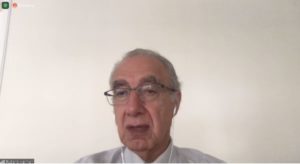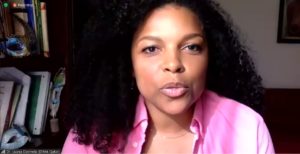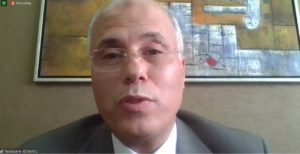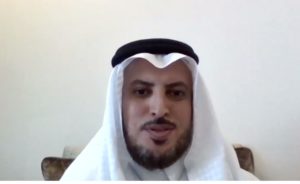São Paulo – Brazilian development bank BNDES president Gustavo Montezano put forward investment opportunities in Brazil for Arab officials and businesspeople on Thursday, 25, in a webinar hosted by the Arab Brazilian Chamber of Commerce (ABCC) in partnership with BNDES, a federal public company aimed at providing financing for endeavors that contribute to the Brazilian economy.
In the online event “Brazil – Overview and Opportunities,” Montezano presented the bank’s work for the Arabs during approximately 40 minutes and then answered some questions from shareholders.
During his presentation, Montezano said BNDES is a state-owned bank associated with the Ministry of Economy. He said we’ve been experiencing a difficult time, the pandemic is something new for Brazil and the world, and it’s an economic variable hard to predict and price accurately.
The bank’s president gave an overview of the Brazilian economy, saying that the administration of the early 21st century managed to control the inflation, and over the last four years Brazil has gone through a fiscal adjustment and several far-reaching structural reforms, and he said there are a series of other major “micro-reforms” to be carried out in Brazil, particularly regarding concessions and privatizations.
According to Montezano, issues that are high on the agenda of BNDES for the next years are focuses on the infrastructure sector; supply chain; education, healthcare, and public security; technological diffusion and innovation; credit and capital markets; sustainability, modernizing state-owned enterprises, and regional development; and countercyclical role.
“We grant loans that can be repaid in up to 35 years. The bank’s involvement is key for the country’s development,” said Montezano. He added BNDES is not open to individuals, as it’s business oriented. “If I had to summarize our mission, we’re an investment bank for the Brazilian state,” he said.
He also addressed the schedule of disinvestment and concessions, and said the bank is open to collaboration with third parties. He said BNDES intends to disinvest in state-owned companies such as Petrobras, Vale and Eletrobras, among others, selling its own share to private investors.

He said the bank launched in 2019 a digital platform called Digital Factory to facilitate the connection between domestic and foreign long-term capital investors and give direct access to information on the products carried out by the bank.
Montezano said there’re currently 122 projects being financed by the bank in 18 segments, involving BRL 228 billion (USD 40 billion) in capital expenditure. The largest concession schedules planned are for roads, sanitation and ports, as well as the privatization of Eletrobras and Correios. The government has also a project for what he calls the “sustainability concessions” for 36 state parks and a federal park to foster the ecotourism, as well as five forest areas of the Amazon and three areas of the national forest in South Brazil, which could be explored and cleared to manufacture wood goods.
He added BNDES has several sustainability initiatives such as renewable energies, sanitation, social investment, biome recuperation and conservation, and urban development.
Q&A
ABCC secretary-general Tamer Mansour and BNDES head of investor relations Gabriel Ervilhas conducted the questions and answers during the webinar.

O diretor-geral do banco de desenvolvimento islâmico ITFC Sovereign Energy Fund (Isef), dos Emirados Árabes, Anisse Terai, perguntou sobre os investimentos na cadeia de suprimentos. “Desempenhamos um papel importante na cadeia de suprimentos, nossa principal posição é através de empréstimo aos bancos, que por sua vez emprestam para os compradores. Temos um portfólio extenso nesse sentido. Quando olhamos para a exposição das nossas instituições financeiras, é agronegócio e cadeia de suprimentos”, disse o presidente do BNDES.
United Arab Emirates’ Islamic development bank ITFC Sovereign Energy Fund (ISEF) director Anisse Terai asked about the supply chain investments. “We play a major role in the supply chain. Our major role is granting loans to banks, which in turn loan to buyers. We have an extensive portfolio in this sense. Our financial institutions are quite focused on agribusiness and the supply chain,” said the BNDES president.
But he said the bank will make an announcement on the financing sector within a few months that may impact particularly the manufactured goods and defense sector. “Over the last eighteen months, we’ve worked with the minister of Economy, the Ministry of Foreign Affairs, and the minister of Defense for a complete reform on our financing sector,” said Montezano. He added the BNDES is likely to have something similar to the export credit agency EXIM Bank of the United States for the Brazilian society. “It’s still unfinished; we’re in talks with the ministries,” he said.
Brazil’s Luana Ozemelha, president of the Development Impact Managers & Advisors (DIMA) in Qatar, asked about how to implement more effective ways to realized practical opportunities.
“We believe the fist step for investors who’re not familiar with Brazil should be made in partnership with a bank such as BNDES. It’s also important to do so with a local fund manager instead of a direct exposure to financial investments. We propose a series of trust funds with private equity so that BNDES may finance 20-30% of that fund and can count on 70% from different investors that are willing to coinvest with us. But always with the management of a large investment managing fund that are part of the Brazilian financial community. That’s an idea we’re advancing for financial investors,” said Montezano. For specific industries of collaboration agreements, he said it’s necessary to talk on a case by case basis.

Dubai’s Mohammad Omar Bin Haider Holding Group (MOBH) agriculture and food general manager Radouane Adamou asked about the possibilities in agriculture and forest area.
“In agriculture BNDES is the main financer of the Safra Plan – we have an agent passing on subsided lines from the government for farmers in Brazil. We have this operation through an indirect loan agent. We’ve been trying to find new ways to offer safeguards for Brazilian farmers. Anyone interested in participating in some financial activities or specific agricultural production areas, we can work together to offer assurances or act as brokers for some part of the lobal supply. We can support the financial operations and part of the output’s working capital,” said Montezano.
“We also have a second line of action, the investment bank with the Project Factor. At the Project Factory we’re drafting a project for natural forest concessions. In this case, you can harvest natural timber using it for construction or furniture, for example, in a 100% legal way, working according with the regulation and keeping the forest healthy. We’re working on that for the next year or maybe early 2023.

Food Security of Saudi Arabia governor’s advisor Abdullah Al Rabeeah said he sees a great potential for working together with BNDES, particularly in agriculture and renewable energies.
Ervilha said he was willing to answer questions and talk with potential investors.
In the opening, ABCC president Rubens Hannun said that topics such as food security, logistics, sustainability, environment and technology are high on the agenda for both regions, with many opportunities for investments, and that the Arab investment could potentially grow even more.
“We know we must work on key points in Brazil to become more attractive to receive these investments. Information and clear legal apparatus, the end of double taxation, creation of facilities, and support for Arab investors are some of the key points for the future of these partnerships, as well as discussing and drafting bills to incentive direct private investment. The ABCC is available to support and strengthen these relations.”
Mansour said this was the first webinar the ABCC has hosted in partnership with BNDES, and he believes they are going to host other two or three online events on other sectors.
Translated by Guilherme Miranda




